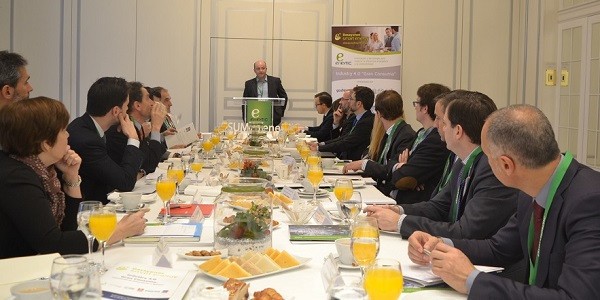Technological trends are driving the consumer goods sector

Industry digitization is making headway in spite of the barriers that balk and worry organizations, especially the dearth of skilled professionals, the adoption of cybersecurity measures and the energy-saving problem. This transformation is based on enabling technologies to achieve intelligent industries that are highly flexible and efficient, capable of integrating collaborative value chains and responding to market demand in terms of sustainability, transparency and personalization.
The new challenges posed by Industry 4.0, digitization and the new technological trends are changing the production models of sectors like food. Mindful of this fact, within the sector-based program brokered by enerTIC, a meeting point has been set up between leading executives and bosses of the consumer goods sector (food and drinks manufacturers) and the main providers of technological solutions, with GMV’s experience and expertise to the fore.
The aim of this encounter was to pinpoint ICT challenges and opportunities in terms of the digital transformation, energy efficiency, innovation and sustainability; find out the main barriers to be overcome; bring the new technologies to wider notice as a way of boosting competitiveness; and stimulate innovation with energy-saving solutions adapted to Industry 4.0.
As for the technological solutions, the conference participants commented on the setting up of management systems based on Big Data and Machine Learning that help them to capture and mine information and analyze it in the best way to make energy-saving decisions. Along these lines, stress was also laid on the need of using cloud services in a software-as-a-service mode to avoid rapid obsolescence of some technologies or the monitoring and traceability of equipment, plant and manufacturing processes to identify possible energy saving. All these integrated technologies are an advantage to businesses and society as a whole, but it is vital to take cybersecurity and interoperability into account when it comes to implementing them. “Developing enabling technologies in the food and drinks sector means speaking of efficiency and competitiveness. It is necessary to develop modular, interoperable and scalable management systems based on enabling technologies that ensure not only the short term aims of cost-saving, optimized energy use and improvement of productivity but also the long-term goals of autonomy and new business models, without organizations having to change their technological development strategy periodically to keep up with specific advances” explained Miguel Hormigo, Team Leader of Industry 4.0 at GMV.
At the end of the day a series of conclusions were drawn, marking out the values to aim for and making significant headway towards a better prepared and more efficient sector. One of the aforementioned conclusions is the commitment of tackling global digital transformation projects that ensure rapid and effective decision-making to improve energy efficiency.